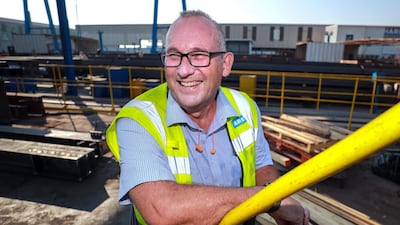Men’s health is the focus of a special campaign throughout November to encourage men to talk about health problems.
It was started in Melbourne, Australia 17 years ago when two friends, Travis Garone and Luke Slattery, aimed to resurrect the much maligned moustache.
Movember, as it became known, evolved into a public health campaign for men to talk about prostate cancer and other health issues.
Prostate cancer is an under-reported area of men’s health but can be easily detected.
“Prostate cancer makes up about five per cent of cancer cases in the UAE, compared with about 15 per cent elsewhere in North America and Europe,” said Dr Manaf Al Hashimi, urology consultant at Burjeel Hospital in Abu Dhabi.
“A lot depends on family history, if an uncle or brother has had the disease the man is more at risk and should be screened.
Screening is usually recommended for anyone over 50, but with a family history of prostate cancer, it should be done at age 40.
The test is a clinical exam and blood test that looks for prostate specific antigens (PSA). A reading higher than three for PSA could warrant further exploration.
“There is nothing embarrassing about the test. Sometimes we may do an ultrasound test to check the size of the prostate,” said Dr Al Hashimi.
Men are notoriously bad at visiting their doctor, even for a routine check-up, he said.
Prostate cancer is the second most common cancer in men globally. More than 1.3 million men are diagnosed with prostate cancer each year. According to World Health Organisation figures from 2018, 12 per cent of all male cancers in the UAE are prostate, 2.4 per cent are fatal cases.
Prostate cancer can present without symptoms, making a blood test vital for early detection.
Treatment is offered through radiation and hormone therapy, or surgeons may decide to remove the prostate.
Dr Waleed Hassen, the department chairman of urology at Cleveland Clinic Abu Dhabi, said data collected at the hospital shows prostate cancer is likely to be as common in the UAE as anywhere else.

“It is the most common cancer in men and in most parts of the world it is the leading cause of solid tumour death,” he said.
“There is a misconception prostate cancer is low in this region - that is one of the challenges as to why people do not get screened as they should.
“One reason is the Middle East has a younger demographic than elsewhere and there is a low number of Emirati men over the age of 50, maybe less than 50,000.
“Because of that we would not expect to see a lot of cases as the average age is younger.
“As the population ages, we expect to see more cases of prostate cancer.”
As the disease is often asymptomatic, there can be a long time between diagnosis and death. If the PSA rate collected from a blood sample is less than 10, there is on average a 30 per cent chance of having prostate cancer, doctors said.
Cleveland Clinic Abu Dhabi performs about 200 prostatectomies - where the prostate or part of it is removed - every year.
“We find that 60 per cent of our specimens are a more locally advanced stage of the disease which suggests a population of men that are not being adequately or accurately screened,” said Dr Hassen.
“They are presenting at a later stage which makes it harder to cure and preserve their quality of life in terms of urinary and sexual function.”
Cancer survivor offers warning to other men
Briton Carl Pittman is recovering from having his prostate removed, almost two years after being diagnosed with cancer.
The 60-year-old was given the devastating news after a routine PSA blood test that probably saved his life.
Early detection gave him an excellent chance of making a full recovery.
Read More
Traditional tobacco use remains stubbornly high in Middle East as smokers shun e-cigarettes
Smoker 'dies' nine times as Abu Dhabi doctors pull patient from the brink
“My advice to anyone who is 50 or older is go for a PSA test every year,” said Mr Pittman, who lives in Mussaffah, Abu Dhabi.
“My results in 2019 were slightly raised so it was investigated further. That’s when I was told I need a biopsy.”
Although there was no history of prostate cancer in Mr Pittman’s family his father had stomach and bowel cancer.
In a recent US study by the Mayo Clinic Cancer Centre of 3,000 patients in Arizona, Florida and Minnesota, it was discovered one in eight cancer patients had an inherited cancer-related gene mutation.
Mr Pittman's surgery took place at the NMC Specialty Hospital, Abu Dhabi in January 2019.
He said the care offered by Dr Rishikesh Pandya, a urologist at NMC Healthcare enabled him to make a full recovery after his prostate was removed.
"I’m very hopeful for the future," said Mr Pittman.
"Within a few months, maybe a year I was back to normal. The most important thing is I’m alive."
“Carl’s cancer was detected early because he knows the importance of prostate awareness,” said Dr Pandya.
“Awareness leads to early detection by screening, so the surgery alone became sufficient.”


